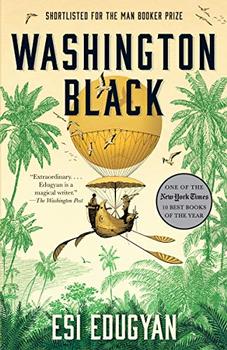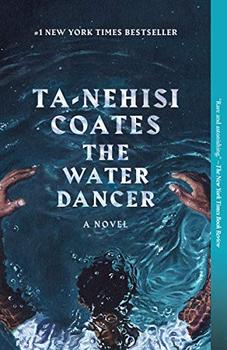Summary | Excerpt | Reading Guide | Reviews | Beyond the book | Read-Alikes | Genres & Themes | Author Bio

A dazzling new novel about a boy who rises from the ashes of slavery to become a free man of the world.
George Washington Black, or "Wash," an eleven-year-old field slave on a Barbados sugar plantation, is terrified to be chosen by his master's brother as his manservant. To his surprise, the eccentric Christopher Wilde turns out to be a naturalist, explorer, inventor, and abolitionist. Soon Wash is initiated into a world where a flying machine can carry a man across the sky, where even a boy born in chains may embrace a life of dignity and meaning - and where two people, separated by an impossible divide, can begin to see each other as human. But when a man is killed and a bounty is placed on Wash's head, Christopher and Wash must abandon everything. What follows is their flight along the eastern coast of America, and, finally, to a remote outpost in the Arctic. What brings Christopher and Wash together will tear them apart, propelling Wash even further across the globe in search of his true self.
From the blistering cane fields of the Caribbean to the frozen Far North, from the earliest aquariums of London to the eerie deserts of Morocco, Washington Black tells a story of self-invention and betrayal, of love and redemption, of a world destroyed and made whole again, and asks the question, What is true freedom?
Beyond her strong characterization, Edugyan just plain writes well. Her story is bright and fresh, avoiding common clichés and building anticipation for the next bend in the story's road. Her descriptions of the Arctic cold and the dry heat of the desert are palpably real. What's more, she makes Washington's interests our own – many readers will likely spend some time exploring the marine life he studies or the aeronautic devices of the 19th century with which he comes into close contact. From the first page you are fully invested, ready and willing to follow the young protagonist wherever he may lead...continued
Full Review
(377 words)
This review is available to non-members for a limited time. For full access,
become a member today.
(Reviewed by Natalie Vaynberg).
Esi Edugyan's Washington Black becomes an apprentice to a man of science and cultivates a far-reaching understanding of scientific and mathematical concepts – something that would never have been expected of a child born into slavery. He contributes his great mind to the aeronautical pursuits of his teacher as well as to the idea of an aquarium for the people of London. (See more about the Publica Aquaria)
 Nobody would be surprised to learn that, until very recently, science was the realm of the white male. Even now, STEM fields (science, technology, engineering and mathematics) struggle to diversify. Yet it is clear that diversity is key to a robust and effective world of science. The most basic example of a lack of diversity...
Nobody would be surprised to learn that, until very recently, science was the realm of the white male. Even now, STEM fields (science, technology, engineering and mathematics) struggle to diversify. Yet it is clear that diversity is key to a robust and effective world of science. The most basic example of a lack of diversity...
This "beyond the book" feature is available to non-members for a limited time. Join today for full access.

If you liked Washington Black, try these:

The Ballad of Jacquotte Delahaye
by Briony Cameron
Published 2025
This epic, dazzling tale based on true events illuminates a woman of color's rise to power as one of the few purported female pirate captains to sail the Caribbean, and the forbidden love story that will shape the course of history.

by Ta-Nehisi Coates
Published 2020
In his boldly imagined first novel, Ta-Nehisi Coates, the National Book Award–winning author of Between the World and Me, brings home the most intimate evil of enslavement: the cleaving and separation of families.